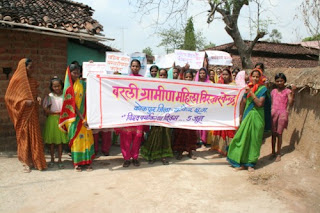Parents Meeting at BarliThe parents of the girls being trained attended the two-day Parents Gathering organized at the Institute from 30th to 31st August, the mid point of the present 6 month training session. 121 parents, guardians and relatives from 44 villages of Jhabua, Khargone, Alirajpur, Dewas, Badhwani and Indore districts attended the program.

On the first day of the program, the parents were introduced to the methodology of how thetraining is given to the girls in order for them to understand the wide range subjects being taught to them. This they did by observing the sessions being held during the day on all the subjects, Personal and Community Development, Literacy, Health and Hygiene and Tailoring. During the sessions, the girls showed their parents their books, their hand-written notebooks, files and drafts and workbooks from the tailoring and other classes. One could easily observe the pride and joy with which the girls were showing their achievements to their parents. Also there were expressions of pride and satisfaction on the faces of the parents.


In the evening Dr. (Mrs.) Janak McGilligan, Director of the Institute, Mrs. Dhedi Baghdare, Program Officer, and Mr. Jimmy McGilligan, Manager of the Institute, gave a power point presentation on the graduates of the Institute who have taken training at the Institute in the previous years and how they were utilizing their skills they have learned, by setting up tailoring shops and other businesses in their villages and neighbouring towns, and how they were using the new found skill to teach others.

The presentation included information how the graduates were using solar cookers, and how the present trainees could obtain these solar cookers. The main purpose of the program on the first day to make the parents aware of the capacities developed and skills learnt by their daughters so hat they could support them on their return to their villages after the completion of the training in another three months.
On the second day of the training, the Director of the institute welcomed all the parents and relatives of the girls and thanked them for coming for the program. She asked them that now that their daughters have been at the institute for nearly three months, they have learnt a lot of skills and also there must be some transformation in them. The parents must be observing these changes in them. Dr. McGilligan requested them to share their observation with all and also to give some suggestions for making improvements in the training. Each parent expressed their happiness at the enthusiasm, dedication towards learning and transformation in their daughters.
Following are some of the emotions shared by the parents:

"I am very happy to see the very strict rule of not being able to meet our daughters during the training period. I feel very satisfied that my daughter is safe here. We, at times, are not able to protect our daughters at home, and here you have the responsibility of and taking care of the safety of 80 girls, and you are answerable to nearly 80 parents. On my return I send more girls for training so that after getting trained they help in the development of their families and the communities.”
“My daughter never used to do any work at home and that was one of the reasons we sent her here for the training. I am very happy to see her doing all kinds of work and she too is happy.”

“The training being given here is of great support to tribal people which will be very helpful in the transformation of life there.”
“My two daughters used to fight a lot earlier. They would not even talk to each other. I am very happy to see them together. They now love each other. This became possible only because of the training here”.
“My daughter showed me books that are being taught here and the clothes she learnt to sew.”
“My daughter says that she has learnt tailoring here and she will now support me in my old age.”
Along with parents, girls also shared some of their thoughts and feelings-
“I used to always think that I am very weak and that I know nothing. But today I feel that I can do lot of things in my life”.





"I used to feel very hesitant and shy of talking in front of others. Now I am able to speak without any fear in front of so many people.”
“Along with learning myself, I am also learning how to teach others.”
“I want to teach literacy to others in the villages who don’t know how to read and write”

“Earlier I would not talk to other people. Now I have learnt how to speak Hindi and also am able to talk to others”.

“I learnt here that we should all live together in unity because God has created us equal”.
“I learnt about cleanliness and hygiene. I learnt that I should not take water from the pitcher with my glass. I will teach all this to others in the village.”
“Earlier I would not talk to other people. Now I have learnt how to speak Hindi and also am able to talk to others”.

Thank Your for your
Vistit our website
EMail Us
 The flight from London to LA on 29th October was 12 hours but we were quite surprised that we not so tired after the journey..
The flight from London to LA on 29th October was 12 hours but we were quite surprised that we not so tired after the journey..





















 The May 2008 Edition of Barli Ki Duniya (World of Barli) in now online it can be found at
The May 2008 Edition of Barli Ki Duniya (World of Barli) in now online it can be found at 




